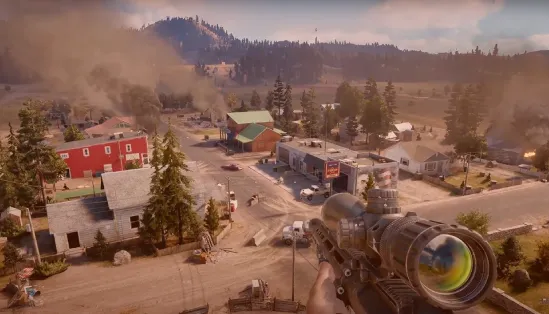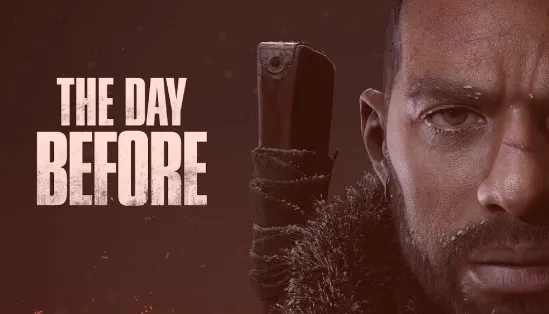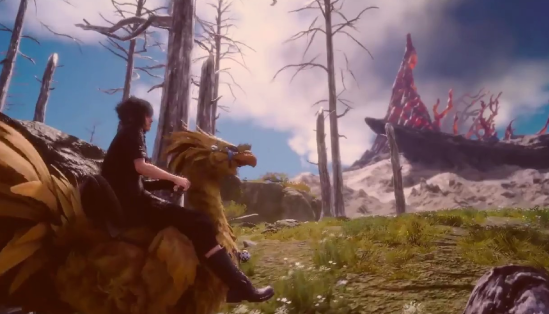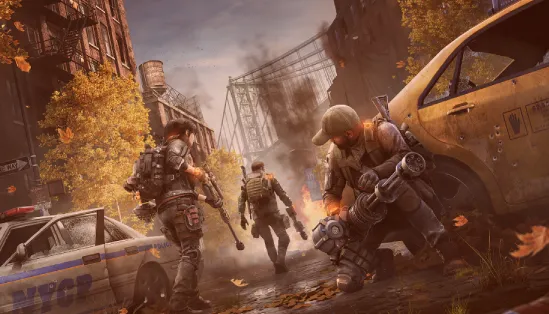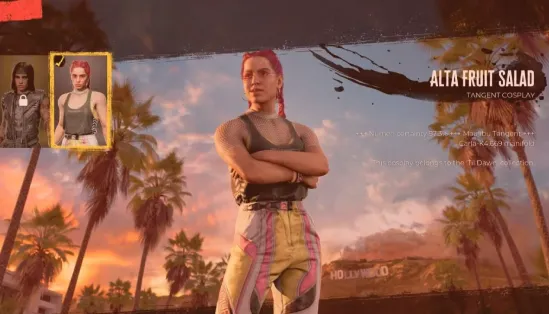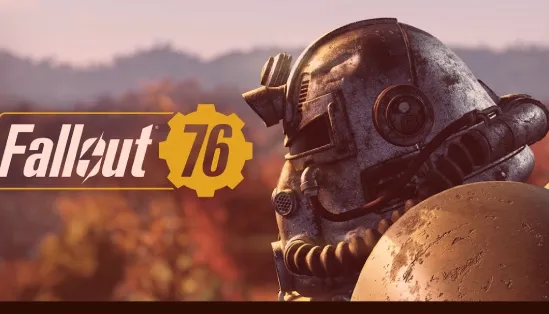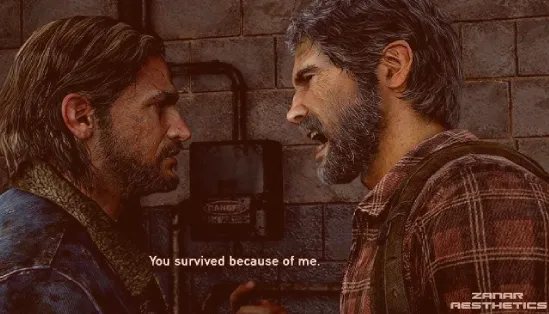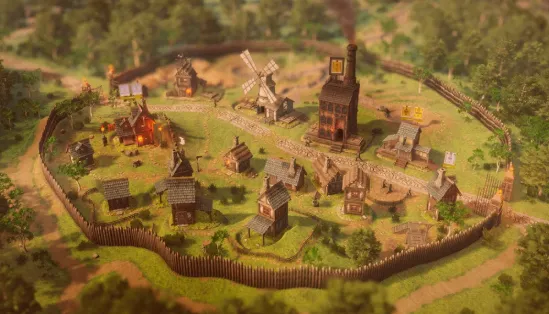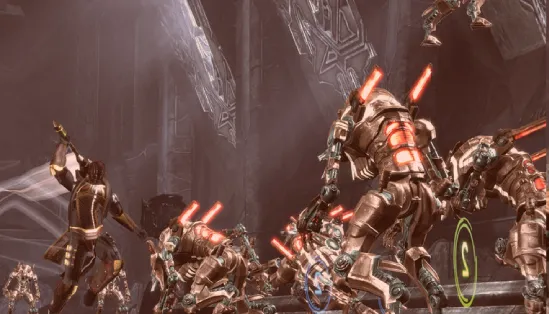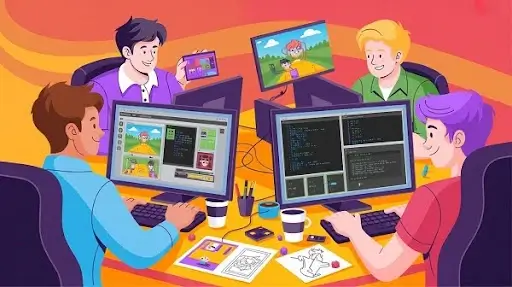Video game trailers have a special kind of magic. In just a few minutes, they can spark excitement, set imaginations racing, and make players count the days until release. But sometimes, that magic is more illusion than reality.
A trailer can promise jaw-dropping graphics, epic gameplay, and an unforgettable story—only for the actual game to feel like a completely different experience. Maybe the visuals were dialed back, the gameplay wasn’t as dynamic, or key features simply never made it in. This is why high-quality game trailer services are so important, ensuring that trailers accurately capture the essence of a game while keeping players excited and informed.
Over the years, many titles have fallen into this trap, leaving players feeling disappointed after the initial hype. That’s why it’s always wise to take trailers with a pinch of salt. After all, a few carefully edited clips can’t tell you everything.
In this list, we’re looking back at games that built sky-high expectations with their trailers—only to struggle when it came time to deliver.
The Day Before – The Lie After
- Release Date: December 7, 2023
- Genre: Open-World, Zombie
- Developer: Fntastic
- Publisher: MYTONA
- Engine: Unreal Engine 5
- Modes: Online Multiplayer, Local Multiplayer
- Platforms: PC
- OpenCritic Rating: Weak
- ESRB: M
When The Day Before was first revealed, it created one of the biggest hype trains in recent gaming history. The trailer promised an open-world MMO experience reminiscent of The Last of Us, mixed with the cooperative style of The Division. It showcased stunning visuals, smooth gunplay, and a richly detailed world teeming with possibilities.
Unfortunately, the reality could not have been further from the promise. Instead of the sleek, immersive shooter fans expected, the released game delivered clunky controls, uninspired and poorly balanced gunplay, downgraded graphics, and an overwhelming number of bugs. It was a far cry from the polished, cinematic gameplay the trailer had teased.
At one point, The Day Before was the most wish-listed game on Steam, making its disappointing launch all the more shocking. What was marketed as a groundbreaking open-world zombie MMO became one of the most infamous examples of overhyped—and ultimately misleading—game marketing.
Final Fantasy XV – Oh, What Could Have Been
- Release Date: November 29, 2016
- Developer / Publisher: Square Enix
- Engine: Luminous Engine
- Multiplayer: Online Multiplayer, Online Co-op
- Platforms: PS4, Xbox One, PC, Stadia
- How Long to Beat: ~28 Hours
- Franchise: Final Fantasy
- ESRB Rating: T for Teen (Language, Mild Blood, Partial Nudity, Violence)
- PS Plus Availability: Extra & Premium
- OpenCritic Rating: Strong
Final Fantasy XV is a game that still leaves many fans with a bittersweet feeling. While the final release delivered enjoyable gameplay, stunning visuals, and memorable characters, it was far from the ambitious vision first teased in its early trailers.
Many of those original previews showcased grand city environments that never made it into the finished game in the same capacity—locations you expected to explore in depth simply became background scenery.
Dramatic, large-scale moments, like the Leviathan battle, were heavily cut down, losing much of their original impact. Even certain teased boss fights, which looked incredible in promotional footage, were absent entirely.
The truth is, Final Fantasy XV endured a long and troubled development. At some point, it’s clear that the game was rebuilt from the ground up, leaving much of that early promise behind. Fans who followed the project from its announcement still can’t help but wonder what the game could have been if the original vision had fully materialized.
Tom Clancy’s The Division
- Genre: Third-Person Shooter, Open-World
- Release Date: March 8, 2016
- Developer: Massive Entertainment
- Publisher: Ubisoft
- Engine: Snowdrop
- Modes: Online Multiplayer
- Platforms: PC, PlayStation 4, Xbox One
- Franchise: The Division
- ESRB Rating: M for Mature 17+ (Blood, Intense Violence, Strong Language, Game Experience May Change During Online Play)
- How Long to Beat (Main Story): ~25 Hours
- How Long to Beat (Completionist): ~85 Hours
- Metascore: 80
- OpenCritic Rating: Strong
- PS Plus Availability: Extra & Premium
- Wiki: Fextralife
When Tom Clancy’s The Division was first revealed, the trailers promised a gripping, immersive experience—organic combat encounters, a rich story, and stunning visuals. The hype was massive, and expectations soared. However, the final release told a different story.
While the game wasn’t bad—it delivered solid third-person shooting, cooperative gameplay, and a large, snowy New York City to explore—it didn’t match the vision shown in its promotional material. The cinematic trailer suggested dynamic, unscripted battles, but the actual gameplay leaned heavily into MMO-style design, with instanced areas, predictable enemy triggers, and less emergent combat than expected.
The visuals also suffered from a noticeable downgrade compared to the jaw-dropping reveal. Ubisoft’s reputation for this kind of graphical reduction didn’t help, and the narrative—far less engaging than advertised—left some players feeling disconnected from the world.
In the end, The Division offered a decent multiplayer experience with a fair amount of content, but for many, it couldn’t escape the shadow of its own marketing. It’s remembered as a game that was enjoyable in its own right, yet ultimately underwhelming for those who expected it to live up to its incredible trailers.
Dead Island – The Tone Was Lost in Translation
- Genre: Action RPG, Survival Horror
- Release Date: September 6, 2011
- Developer: Techland
- Publisher: Deep Silver
- Engine: Chrome Engine
- Platforms: PS4, PS3, Xbox One, Xbox 360, PC
- Multiplayer: Online Multiplayer
- ESRB Rating: M for Mature – Blood and Gore, Drug Reference, Intense Violence, Sexual Themes, Strong Language, Use of Alcohol
- PS Plus Availability: Extra & Premium
When Dead Island’s first trailer dropped, it instantly became one of the most memorable in gaming history. Told entirely in reverse, it depicted a family vacation turning into a nightmare as they were attacked by zombies.
It was emotional, cinematic, and haunting—unlike anything else in the genre. The trailer promised a dark, heart-wrenching look at the chaos and fear of a zombie outbreak in a tropical paradise.
However, the game itself told a very different story. Instead of the grim, grounded horror that the trailer suggested, players found a melee-heavy action experience with a surprising dose of dark comedy.
The tone leaned far more toward exaggerated mayhem—like a first-person Dead Rising—than the tense, survival-focused drama of something like The Last of Us.
That’s not to say Dead Island was a bad game. It delivered fun, chaotic zombie-slaying action and had its share of memorable moments. But for many, the haunting vision from the trailer was the game they truly wanted—a darker, more emotional survival horror that never quite made it past the marketing stage.
Watch Dogs – We Can Forgive, But Never Forget
- Release Date: May 26, 2014
- Genre: Open-World Action Adventure
- Platforms: PS4, PS3, Xbox One, Xbox 360, Nintendo Wii U, PC, Stadia
- Developer: Ubisoft Montreal
- Publisher: Ubisoft
- Engine: Havok
- Average Playtime: ~20 hours
- Franchise: Watch Dogs
- Multiplayer: Online
- ESRB Rating: M for Mature – Blood, Intense Violence, Nudity, Strong Language, Strong Sexual Content, Use of Drugs and Alcohol, Game Experience May Change During Online Play
- PS Plus Availability: Extra & Premium
- OpenCritic Rating: Strong
When Watch Dogs was first revealed, it took the gaming world by storm. The initial trailer promised a revolutionary leap into the next generation of gaming — stunning visuals, fluid animations, and a deep, meaningful hacking system that would reshape open-world gameplay. It was bold, ambitious, and, frankly, jaw-dropping.
But when the game finally arrived, reality didn’t quite match the dream. The most infamous disappointment came in the graphics department. The visuals, which once looked like a showcase for the power of the PS4, were significantly downgraded. Instead of next-gen spectacle, the final release looked much closer to the previous console generation.
The combat shown in the trailer also painted a different picture — dynamic gunplay, smooth acrobatics, and cinematic effects that hinted at a thrilling new standard. In the final product, while the shooting mechanics were functional and the hacking abilities were still interesting, everything felt toned down. The hacking, once marketed as the core mechanic that would define the game, ended up being a cool feature rather than the transformative experience many had hoped for.
That said, Watch Dogs was far from a bad game. Stripped of the overhype and broken promises, it stood as a solid open-world action adventure with a unique twist. The hacking system, even in its scaled-back form, offered creative ways to approach missions. The world of Chicago was fun to explore, and the storyline had its moments of intrigue.
In the end, Watch Dogs may be remembered as much for what it promised as for what it delivered. It’s a reminder that sometimes marketing dreams don’t survive the reality of game development — but also that a game can still be enjoyable, even if it isn’t the groundbreaking experience we were led to expect.
Fallout 76 – It Just Works
- Genre: Action RPG
- Release Date: November 14, 2018
- ESRB Rating: M for Mature (Blood and Gore, Drug Reference, Intense Violence, Strong Language, Use of Alcohol)
- Developer/Publisher: Bethesda
- Engine: Creation
- Multiplayer: Online Multiplayer
- Cross-Platform Play: No
- Cross Save: No
- Franchise: Fallout
- Steam Deck Compatibility: Yes
- Platforms: PC, PlayStation 4, Xbox One
- Estimated Playtime: 34 Hours
- Xbox Series X|S Optimized: No
- File Size (Xbox Series): 97 GB (May 2024)
- Metascore: 53
- PS Plus Availability: Extra & Premium
- OpenCritic Rating: Weak
- Wiki: Fextralife Wiki
Fallout 76 was one of Bethesda’s most ambitious projects—a fully online Fallout experience—but it struggled at launch. The initial trailer promised a visually stunning world and classic Fallout gameplay with other players, but the reality fell short.
Graphically, the game looked worse than Fallout 4 in some areas, and many of the dynamic lighting and environmental effects shown in promotional material were missing.
Players also found the world unusually empty. Instead of the beloved NPCs that made previous Fallout games feel alive, the game featured only audio tapes and robots. The absence of human interaction was jarring, leading to immediate backlash. Bethesda responded with updates and DLCs that gradually introduced NPCs and enriched the game world.
Over time, Fallout 76 has evolved into a much more enjoyable experience. While it faced significant criticism at launch, ongoing updates have transformed it into a solid online RPG that captures the essence of the Fallout universe.
The Last of Us Part II – “We Wanted Joel”
- Genre: Action, Adventure
- Release Date: June 19, 2020
- ESRB Rating: M for Mature – Blood and Gore, Intense Violence, Nudity, Sexual Content, Strong Language, Use of Drugs
- Developer: Naughty Dog
- Publisher: Sony
- Engine: Proprietary
- Platforms: PlayStation 4, PlayStation 5
- Cross-Platform Play: No
- Cross Save: No
- Franchise: The Last of Us
- Steam Deck Compatibility: Yes
- Average Playtime: 24 hours
- Metascore: 93
- OpenCritic Rating: Mighty
- Xbox Series X|S Optimized: No
The trailer for The Last of Us Part II created high expectations by showing a game that felt very different from the final product. Many fans were misled into thinking Joel would play a central role throughout the game, with trailers depicting him in scenes that never actually occur. This led to disappointment and even discussions of potential false advertising claims against Naughty Dog.
In reality, Joel’s presence in the game is brief. He is removed from the story early on, appearing mainly in flashbacks for the remainder of the game. The trailers suggested that players would experience the story primarily through Joel and Ellie, but the game instead shifts focus to Joel and Abby, a choice that sparked considerable backlash.
Many fans feel the emotional impact of Joel’s absence could have been more powerful if he had been present for longer before being taken away. After waiting seven years for the sequel, losing Joel so early felt less like a dramatic narrative choice and more like a missed opportunity.
Ultimately, the game promised by the trailers—centered on Joel, Ellie, and Abby—differs from what players actually received. While The Last of Us Part II remains a critically acclaimed experience, the gap between expectation and reality left some fans feeling that the story didn’t fully deliver on its promise.
BioShock Infinite – The Lie in the Sky
- Genre: Shooter
- Release Date: March 26, 2013
- ESRB Rating: M for Mature (Blood and Gore, Intense Violence, Language, Mild Sexual Themes, Use of Alcohol and Tobacco)
- Developer: Irrational Games
- Publisher: 2K
- Engine: Unreal Engine 3
- Franchise: BioShock
- Platforms: PS3, Xbox 360, PC, macOS, Linux
- Average Playtime: 12 Hours
- Metascore: 94
- PS Plus Availability: Premium (Complete Edition)
BioShock Infinite is widely regarded as a solid entry in the BioShock series, offering an engaging story and immersive world. However, many longtime fans felt that the game didn’t fully deliver on the promises made in its initial trailers. Several abilities teased, such as turning an enemy’s weapon against them, or Elizabeth using retro-futuristic combat powers, never appeared in the final release.
Additionally, some of the early footage suggested more visually striking environments than what players ultimately experienced. While the game’s graphics were an improvement over the original BioShock, they fell short of the expectations set by the previews.
Combat in BioShock Infinite also underwent significant changes during development, which contributed to a gameplay experience that felt more restrained compared to the dynamic action hinted at in promotional material. Despite these discrepancies, the game still offers a compelling narrative and unique setting, making it worth exploring for fans of the series.
Fable: The Master Deceiver – Peter Molyneux
- Genre: Action RPG
- Release Date: September 14, 2004
- ESRB Rating: M for Mature 17+ (Blood and Gore, Language, Sexual Content, Use of Alcohol, Violence)
- Developer(s): Big Blue Box Studios, Lionhead Studios
- Publisher(s): Microsoft Game Studios, Feral Interactive
- Engine: RenderWare
- Franchise: Fable
- Platforms: PC, Xbox (Original), Xbox 360
- Average Completion Time: 13 hours
Fable is one of the most memorable examples of a game that promised more than it delivered. From its very first trailers, the game was presented as a groundbreaking RPG where every choice mattered, the world evolved around the player, and morality—good or evil—would shape your journey.
In reality, many of these promises fell short. The “choices” were often superficial, and the consequences minimal. The most extreme villainous actions typically involved little more than making rude gestures or using crude language. Despite these limitations, Fable offered a unique experience at the time and stood out as one of the few games attempting to explore the concept of choice and consequence.
Today, Fable remains a franchise remembered with a mix of nostalgia and skepticism. It’s a series that encourages curiosity—but always with a hint of caution about just how much it delivers on its promises.
Too Human – What Could Have Been
- Released: August 19, 2008
- ESRB: T for Teen due to Blood, Language, Mild Suggestive Themes, Violence
- Developer(s): Silicon Knights
- Publisher(s): Microsoft Game Studios
- Engine: Havok
- Multiplayer: Local Multiplayer
- Platform(s): Xbox 360
If you weren’t following the gaming scene in 2008, it might surprise you to learn that Too Human was hyped as the next major RPG sensation. At a time when Bioware was dominating with titles like Mass Effect and KOTOR, Too Human promised to be a worthy competitor.
The excitement around the game was enormous. Its trailers showcased impressive graphics, unique animations, and a tone that felt fresh—a mix of sci-fi and Norse mythology that many likened to a futuristic Witcher before that series gained popularity. Gamers were intrigued and eager to dive in.
Unfortunately, the final product didn’t live up to expectations. The controls were clunky, the animations felt outdated compared to other action games, and the story—which had been a major selling point—was disorganized and confusing.
What seemed like the next big thing in RPGs ended up being remembered as one of the more significant disappointments in gaming history.
Related Article:

